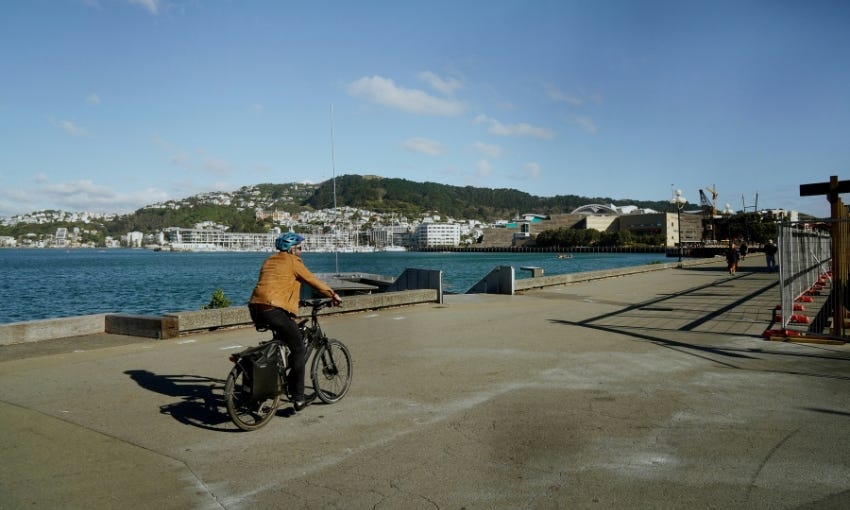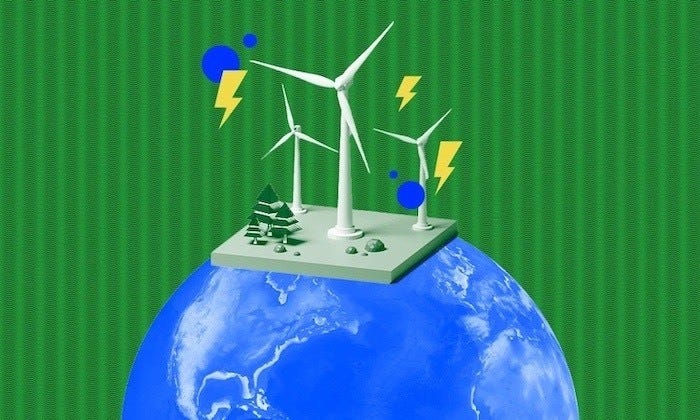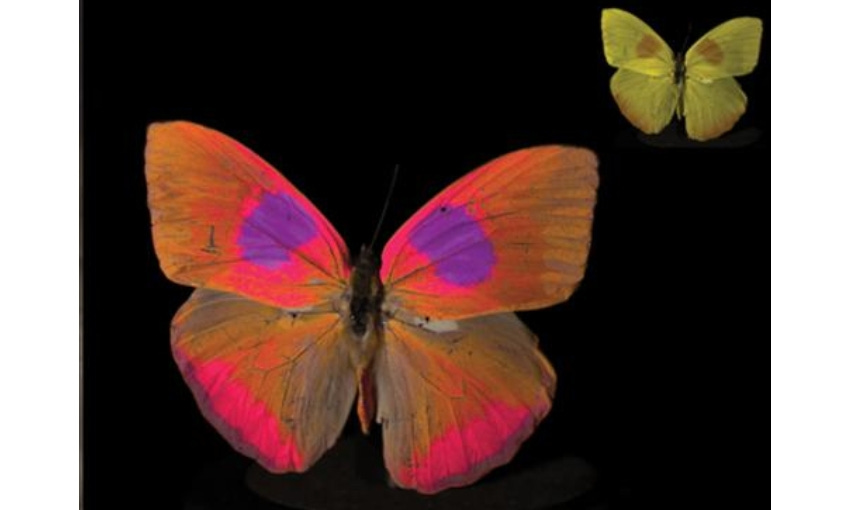On your bike for the climate
Swapping just one trip from car to bike delivers big carbon savings.
Kia ora, this week’s Future Proof is coming to you a day later than usual due to the distressing news of the sudden passing of Fa’anānā Efeso Collins – husband, father-of-two and Green MP. Collins was a champion for economic and social justice, and climate action. Here’s an excerpt from his maiden speech in Parliament, delivered just last week:
The greatest challenge facing our generation is climate change. The Pacific Islands nations are among the most vulnerable to climate change in the world. The world's continued reliance on fossil fuels, loss of coral reefs, rising sea levels, and increasing severe weather patterns means that our extended whānau in the Pacific are in immediate danger. We, as a collective, must do all we can to do as we say out south "flip the script".
Truth is, those who've done the least to create this predicament are being the hardest hit. Our challenges, whether ecological, geopolitical, or cultural, are diverse, but we're bonded by the inextricable ties we have to our lands and our oceans. We've inherited philosophies, knowledge systems, and profound ecological wisdom that holds the answers and drives our collective resilience—from West Papua to Hawai'i. Our fight for a climate resilient, nuclear-free and independent Pacific remains as strong as ever.
We are not drowning; we are fighting.
My thoughts are with Collins’ family and friends.
“What if I told you there was a magic thing that could boost your health, uplift your mood, is good for the environment and also good for your pocket?” says Christina Sorbello from Love to Ride.
The answer is, of course, cycling. This month the Aotearoa Bike Challenge is encouraging New Zealanders to “ride and shine” – and win prizes for encouraging others to get on their bikes. The challenge is in its seventh year, with more than 100,000 of us saving more than 4 million kg of carbon emissions over that time (on rides for transport purposes, rather than just for fun).
Anyone, no matter their ability, can take part by riding a bike anywhere, anytime during February. Each ride earns points, and more points means more chances to win prizes. “But the big points are for encouraging others to ride with you,” Sorbello explains.
The goal behind the challenge is to help more people “overcome their barriers to get on a bike and give it a go,” says Sorbello. “Our stats show over half (56%) of people who come to the challenge as new riders increase how often they are riding six months after the challenge – so we are sustaining long-term behaviour change.”
For newbies, Sorbello recommends getting started on a fine-weather day on a quiet street or path, then working up from there. Love to Ride offers mini-courses to upskill that take a few minutes to complete. “One of our most popular courses in New Zealand is our Riding in the Rain course,” Sorbello says, adding the e-bikes have been a “gamechanger” for addressing hilly topography.
Of course, if we want more folks on bikes, we need more safe cycling infrastructure. Participating in the challenge can help with this, too. Anonymised trips logged with Love to Ride are compiled into a heat map showing where cyclists are riding. Soon, the app will also include a “Rate your Routes” feature allowing riders to rate stretches of road according to how safe they feel. All this data can be used by planners to make areas better for bikes.
On the Love to Ride website, cyclists share their reasons for riding: “for fun and fitness”, “cheaper than petrol and parking”, “it makes me feel free”. But there’s also a substantial climate benefit: shifting one trip from car to bike each day can slash your emissions by 67%, according to one study.
It’s not too late to take part – there’s one week left in the challenge, and 87,750 km to go to reach the overall goal of 1 million km of cycling for A-to-B transport. Time to get on your bike and ride (and maybe win some sweet prizes).
The investment platform targeting climate resilience
The response to climate change is shifting the way we generate and use energy, transitioning from a fossil fuel economy to one based on renewables.
AMP's Global Climate Fund, a new investment fund seeking to invest approximately $500m over the next few years, was made in response to this, targeting the infrastructure that society and the economy needs to transition from a fossil fuel economy to a renewable one.
Coffee cup conundrums
In a recent edition we discussed reusable coffee cups and the Stanley tumbler phenomenon – but what’s the climate cost when your eco-friendly swap becomes “collectable” and morphs into a catalyst for simply buying more? Compostable single-use packaging may seem to offer another sustainable switch, but there are no silver bullets, Shanti Mathias finds in an investigation into plastic vs compostable packaging.
Pockets of protection will have big impacts for Hauraki Gulf
Boosting marine protection in Tīkapa Moana the Hauraki Gulf would dramatically increase the biomass and egg production of tāmure snapper and kōura crayfish, Benn Hanns writes in The Spinoff, drawing on his own just-published research. The proposed marine protected areas are outlined in a bill yet to be passed, which would also limit bottom trawling in large parts of the Gulf. Minister for Oceans and Fisheries Shane Jones, known for his close ties to the commercial fishing industry, has said he will revisit this decision, and others related to bottom trawling, and will review the roll-out of cameras on fishing vessels.
Why environmentalists are worried about fast-track consenting
“I hope I’m getting across how worried I am,” Marnie Prickett tells Emma Ricketts in this Spinoff piece. A new fast-track consenting proposal would allow infrastructure projects to bypass environmental law and community consultation, leaving decisions to “the whim of a single person”. Environmentalists have also strongly criticised the government’s rollback of environmental laws, submitting that it constitutes a breach of New Zealand’s Free Trade Agreement with the UK, by creating implicit subsidies for exporters. “We have seen in the early days of this coalition government what can only be described as a war on nature,” Kayla Kingdon-Bebb, chief executive of WWF-New Zealand, told RNZ.
If you thought Bad News was over, bad luck, there’s more Bad News
Why does no one care that the world is ending? How will we all survive when everything falls apart? If you’re haunted by these dilemmas, then Alice Snedden’s new two-part special is coming next week to save you. Premiering Tuesday, 27 February on The Spinoff, Alice Snedden’s Bad News Saves the World sees her learning to light fires in the bush and asking if societal collapse is inevitable. Can someone fix climate change in 20 minutes? Watch and find out as Alice prepares for the worst and Alice picks a fight with farmers (in the name of Rose Matafeo).
Made with the support of NZ On Air.
More stories
For 50 years, the plastic and oil industries have known that recycling isn’t a viable long-term solution for their products, but promoted it anyway, “echoing Big Tobacco’s campaigns of deception”, a report reveals.
Demolishing Wellington’s character homes would be better for the environment, Eleanor West argues on The Spinoff.
Some people don’t want kids for environmental reasons, but the truth behind a study on the carbon impact of having children is complicated.
A remote Fiordland kiwi population is bouncing back after aerial predator control.
Why global support for climate action is systematically underestimated.
Could lab-grown “beef-rice” offer a more sustainable protein source?
Natural asset companies want to put a market price on nature to save ecosystems rather than destroy them.
A kaupapa inquiry at the Waitangi Tribunal will focus on climate change policy, Newsroom’s David Williams reports, with a claim that the Crown’s failure to address climate change and protect Māori communities is a Treaty breach.
Join our community of supporters
Since the start of the year, Spinoff readers have helped fund some of our most popular and important work. Our newly launched editorial series War for Wellington, coverage of Waitangi Day, explainers of te Tiriti, impactful essays, investigative journalism, beloved podcasts and more. Whether you read, listen to or watch our mahi, you can support us to do more by donating today or signing up to become a Spinoff member.
Orange-barred sulphur butterfly (Phoebis philea) seen in avian vision (magenta) and human vision (yellow, inset). Image credit: Vasas et al., PLOS Biology.
To finish this issue, a butterfly that appears yellow to us may have entirely different colouration in the eyes of a bird. Researchers have devised a new video and software system to capture how different animals see the world (and us!) according to the different light receptors in their eyes. This New York Times interactive includes some fascinating examples. For birds, this ability to see ultraviolet means many species have hidden feather fashion we can’t see – and that includes our own native species.
B-eye for now,
Ellen
Got some feedback about Future Proof or topics you’d like covered? Get in touch with me at futureproof@thespinoff.co.nz













There are a lot more things to consider, apart from carbon emissions, when deciding whether to have children. For a start, we are not on a trajectory to reduce our climate emissions in accord with various agreements. We have already reached 1.5° of heating - do you want to bring a child into a world of more frequent heatwaves, wildfires, floods and cyclones, in addition to food and housing shortages? Moreover every additional human being on the planet means there is less room for all the other species we are crowding out of existence. Our need of food and our insistence on animal husbandry destroy biodiversity and increase pollution: every extra mouth adds to this impact. And then there are all the resources dug out of the ground to provide Baby with its stroller and car seat, its disposable nappies and adorable little outfits, its plastic toys and baby bath. And the growing child will "need" an increasing number of resource-intensive objects from tablets to (more) toys. One Western child puts a huge load on our struggling planet - overpopulation is far less of a problem than overconsumption, but the damage from both is hard to exaggerate.